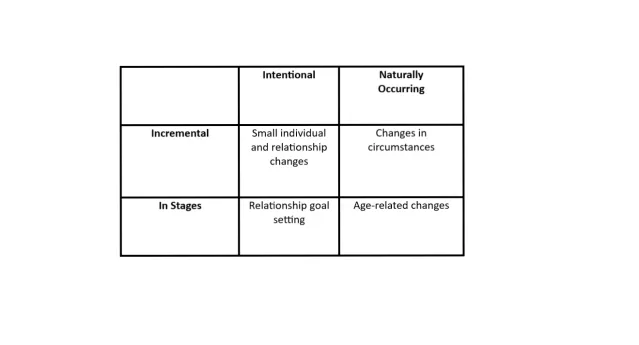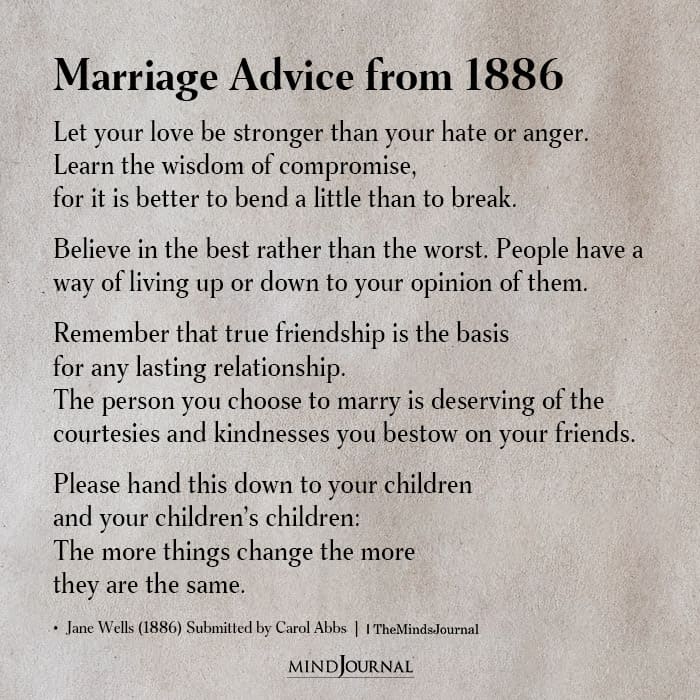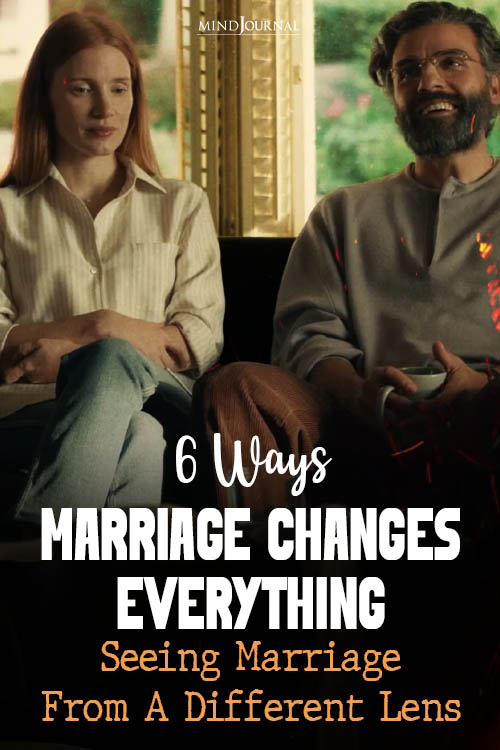Marriage changes everything—sometimes in ways you expect, and other times in ways that take you by surprise. The effects of marriage go beyond just a new last name or shared bills; it shifts how you see each other, how you fight, and even how time feels.
It’s a wild ride of love, growth, and plenty of “we had no idea this would happen” moments. This article is going to talk about the 6 effects of marriage and what it entails.
KEY POINTS
- Different types of changes occur in a marriage.
- It’s important to have ongoing communication to discuss the impact of changes and address any concerns.
- Marriage is evolving, with later marriage ages and higher divorce rates.
After going together for six years, Emma and Mike got married, thinking things in their relationship would not change much. As Emma says, they were “wildly and hilariously” wrong.1
Related: 5 Things to Know About Marriage Before Your Wedding Day
How Marriage Changes Everything: The Marriage Effect
1. You address each other differently.
Things are different as soon as the wedding official says you are husband and wife. The wife and husband were wonderfully new and kind of funny. Emma and Mike started telling everyone: waiters, flight attendants, and friends.
2. You work differently.
Everything you do is now for both of you. Even things you accomplish on your own, now with the support and backing of your spouse, are our triumphs together.
3. You fight differently.
You will need more than a bad mood or an emotional trigger to leave. You stick it out in marriage. Marriages do end, but not capriciously. Being married means all kinds of connections and entanglements must be untangled.
4. You look at the world differently.
For Emma, there is a sense of steadiness that was not there before. As she says, security is not sexy, but there is a sense of confidence that goes with it.
5. The world looks at you differently.
In marrying, you are making a highly public act of faith, hope, and optimism. The public act of getting married makes your relationship something that others—friends and family—have a stake in.
6. Time moves differently.
For Emma and Mike, being together, being a team, makes time fly. Time together as a couple before marriage seems to be slower—maybe because they were getting to know each other and didn’t know what the outcome would be.
How Psychologists Talk About Change
Psychologists tell us that change includes both intentional changes and naturally occurring changes.2 Changes can also happen incrementally, i.e., gradually, and they can happen in stages, which may result in big differences in the quality of the relationship.3
Putting together these different ways change can happen will help us understand what kinds of changes occur in marriage. Here is a schematic showing these different kinds of change and how they can show up in your marriage.

1. Incremental/intentional.
These are the small changes we make in ourselves, our partners, and how we interact with one another.
These are the gradual changes that occur when we look at how we act in our marriage, how our relationship feels, things we like and dislike about our partners, etc.
A few examples of changes we are likely to make: How to handle chores, when to have sex, how to handle money, and how much to tell each other about the not-together time.
2. In stages/intentional.
This change describes couples’ goal setting: Where do we want to be in five years? What kind of house do we want to live in? Where and when shall we retire? How will we take care of each other as we age?
3. In stages/naturally occurring.
This is the well-known stage theory of marriage in which change occurs developmentally in qualitatively different phases that occur with the time in the marriage.
You will find different ways of describing the stages and how many married people go through.
Here is a three-stage model with stages identified as:
- Romantic Love
- Disillusionment and Distraction
- Dissolution, Adjustment with Resignation, or Adjustment.4
Here is a more detailed six-stage model:
- The loving relationship.
- The honeymoon is over.
- Getting even.
- Hanging in.
- Doing your own thing.
- Growing up.5
The Process of Change
Partners must interact with one another to create the changes they want and will encounter in their marriage.
Here are different kinds of interactive processes they can use to manage these changes.
1. Negotiation.
Couples typically negotiate changes they intentionally want in their relationship. Maybe you want a change in the relationship because of a disagreement or difference between you.
Maybe one of you has an idea about how things can work better. You will want to negotiate collaboratively by making sure each has a say, each is listened to, and what both of you want is considered in any resolution.
This is neither a competition nor a quid pro quo exchange way of negotiating.6
2. Individual change through self-reflection.
There will be times when you reflect on what kind of partner you are. For example, you recognize that you tend to isolate yourself when a disagreement occurs and see that this is not good for the relationship.
It is important to let your partner know about your self-initiation changes.
Related: 12 Secrets To A Successful Marriage That Only Divorce Lawyers Know
3. Request for a change in your partner.
You will find things about your partner that you would like to have changed—a tricky business. Here are a few hints.
First, do some self-reflection. Make sure about your motives or the request—what is your self-interest in the change? Do you genuinely think the change would be good for your partner?
When you make the request, be sure that it is not a demand. Do speak about the impact of the requested change on you. But make sure you are willing to adjust if they do not want to make the change.
Or do you need to identify this as a dissatisfaction in the relationship?
4. Adjustment to naturally occurring changes.
Changes that occur to us typically require some adjustment on our part as individuals and as a couple. It is important to talk to each other about how to make these kinds of adjustments.
All of these ways of interacting with one another around the inevitable changes that will occur, naturally or by intention, require ongoing discussion. Discussion is about talking to each other.
For example, what does each change mean to each of you? Is there a sense of loss or gain about the change, or are there difficulties that happen because of the change? This kind of discussion or dialogue can be ongoing; it need not be time-limited.

The Changing Landscape of Marriage
While marriage has been seen as the bedrock of healthy families and communities and vital to the functioning of democracy, it is no longer the same institution it was.7
Today, nearly half of all marriages end in divorce, and people are getting married later than they used to; in 2021, the median age at first marriage for men was 30.2, and for women, 28.1. 8
Sociologist Anthony Giddens theorizes that the romantic love model of marriage, which emphasizes relational permanence (till death do us part) and complementary gender roles, is being replaced by a new model of intimacy that he calls the “pure relationship.” 8
A pure relationship is entered into for its own sake and is maintained if both partners find enough satisfaction to stay in the marriage. Partners establish trust through good communication and effective interaction processes.
Giddens argues that pure relationships are more egalitarian than traditional romantic relationships, which can result in greater happiness for partners and foster a greater sense of autonomy.
Related: 5 Simple Ways To Strengthen The Friendship In Your Marriage
While our idea of marriage is changing, we continue to hold on to romantic ideas, such as the idea that true love lasts forever and love can overcome any obstacle.
Giddens tells us that how we communicate and interact with one another is fundamental to our newer ideas about marriage. Paying attention to the changes in your marriage so you can manage them well will support and enhance your relationship.
References:
Staub, E. “The Marriage Effect: Here’s What Changes When You Get Married.” Brides. 03/17/21. https://www.brides.com/story/what-changes-after-marriage-emma-straub.
Neo, A.H.C. and Chang, W.C. “The Construct of Change in Close Relationships.” Scientific Research (www.scrip.org). Vol.8 No.8, June 2017.
Pelaez, M., Gewirtz, J.L., and Wong, S.E. “A Critique of Stage Theories of Human Development.” In B. A. Thyer, K. M. Sowers, & C. N. Dulmus (Eds.), Comprehensive handbook of social work and social welfare, Vol. 2. Human behavior In the social environment (pp. 503–518). John Wiley & Sons Inc. https://doi.org/10.1002/9780470373705.chsw002020
Harris, V.W. “Three Stages of Marriage.” IFAS Extension, University of Florida. March 2012 (http://edis.ifas.ufl.edu.)
Travers, Mark. “A Psychologist explains the 6 Stages of Marriage.” Forbes. October 23, 2023.
Aponte, C. (2019) A Marriage of Equals: How to Achieve Balance in a Committed Relationship. Berkeley, CA: She Writes Press.
Hull, K.E., Meier, A. and Ortyl, T. “The Changing Landscape of Love and Marriage.” National Library of Medicine. November 2014 (https://www.ncbi.nlm.nih.gov/pmc/articles/PMC4244648/)
“A Record-High Share of 40-Year-Olds in the U.S. Have Never Been Married.” June 28, 2023. (https://www.pewresearch.org/short-reads/2023/06/28/a-record-high-share-of-40-year-olds-in-the-us-have-never-been-married/).
Hull, Meier, and Ortyl.
Written By Catherine Aponte
Originally Appeared On Psychology Today










Leave a Reply